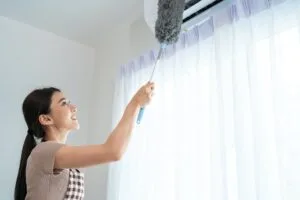Achieve Optimal Humidity For Better Indoor Air Quality In Your KC Home
Humidity plays a significant role in the overall quality of indoor air, affecting not just the comfort of your home but also the health and well-being of its occupants. Maintaining an optimal humidity level is essential to prevent the growth of mold and mildew, reduce allergens, and create a comfortable living environment. However, achieving this balance can be challenging, particularly in a region like Kansas City with its fluctuating climate conditions.
In this article, we will delve into the importance of humidity levels in indoor air quality and guide you on how to maintain appropriate humidity in your home year-round.
With insights from Climate Control Heating, Cooling & Plumbing, your trusted provider of Kansas City heating, cooling, and plumbing services, we aim to help you create a healthier and more comfortable home environment for you and your family.
Understanding The Link Between Humidity And Indoor Air Quality
Humidity refers to the amount of water vapor present in the air. Various factors, including temperature, ventilation, pollutant levels, and humidity influence indoor air quality. Maintaining proper humidity levels is crucial for a comfortable and healthy living environment, as high humidity can encourage mold and mildew growth. In contrast, low humidity can lead to dry skin, irritation, and respiratory issues.
An ideal humidity level for most homes is between 30% and 50%. During summertime in Kansas City, when humidity tends to rise, maintaining this range can be challenging but is essential to protect your home and ensure the well-being of its occupants.
Dangers Of High Humidity
When humidity rises beyond the recommended level, several issues can arise, negatively impacting both your home and your health.
- Mold and mildew growth: Moist and humid environments promote mold and mildew, which can cause structural damage and trigger allergies or respiratory problems.
- Dust mite proliferation: High humidity fosters a suitable environment for dust mites. Dust mite allergens can exacerbate allergies and trigger asthma symptoms.
- Condensation: Excess humidity can lead to condensation on windows, walls, and other surfaces, potentially causing water damage, peeling paint, or wood rot.
- Poor air quality: High humidity can make the air feel stuffy, compromising overall air quality and comfort levels in your home.
- Health risks: High humidity can cause dehydration, heatstroke, and other heat-related illnesses, particularly for elderly individuals or those with pre-existing health conditions.
Problems Associated With Low Humidity
Insufficient humidity in your home can also cause various issues, particularly during the colder months when heating systems tend to remove moisture from the air.
- Dry skin and irritation: Low humidity can cause dry, itchy skin, as well as irritate the nose, throat, and eyes.
- Respiratory issues: Dry air can exacerbate asthma or allergy symptoms and may contribute to colds and respiratory infections.
- Static electricity: Low humidity can increase static electricity, creating minor shocks and potentially damaging electronics.
- Damage to wood: Insufficient moisture in the air can cause hardwood flooring, furniture, and other wooden items to shrink, warp, or crack.
- Discomfort: Dry air can make you feel colder than the actual temperature, leading to increased heating costs and discomfort in your home.
Measuring And Adjusting Humidity Levels
To effectively manage humidity levels in your home, you first need to measure them. You can use a hygrometer, an affordable and widely available device used for measuring humidity levels. Once you have identified the humidity level, you can implement strategies to either increase or decrease it as needed.
- Use a dehumidifier to remove excess moisture: Dehumidifiers work by extracting moisture from the air, helping to maintain a comfortable humidity level. Whole-house dehumidifiers can be installed as part of your HVAC system, while portable units are a cost-effective, flexible option.
- Install exhaust fans in the kitchen and bathroom: Exhaust fans help remove moisture and improve ventilation, especially in areas where humidity tends to be higher.
- Incorporate a whole-house humidifier or portable humidifier: Humidifiers release moisture into the air, helping to maintain a comfortable level during dry months. Whole-house humidifiers can be integrated into your heating and cooling system or added to individual rooms for a targeted approach.
- Improve ventilation: By allowing fresh, outdoor air to enter your home, you can help regulate humidity levels. Ensure that your HVAC system is functioning efficiently, and consider opening windows for a few minutes each day when weather permits.
- Use weather-appropriate strategies: During colder months, when humidity levels are lower, you can utilize natural techniques like cooking, showering, and hanging wet laundry indoors to help add moisture to the air.
- Seal leaks and insulate your home: Ensuring that your home is well-insulated and sealed can prevent outdoor humidity from entering and affecting your indoor air quality.
Trust Climate Control Heating, Cooling & Plumbing To Optimize Your Home’s Humidity
Managing humidity levels is an essential aspect of maintaining optimal indoor air quality in your Kansas City home. By understanding the relationship between humidity and air quality and implementing practical measures to balance humidity, you can create a more comfortable, healthy, and energy-efficient living environment.
Climate Control Heating, Cooling & Plumbing, your trusted partner for Kansas City heating, cooling, and plumbing services, is here to help you achieve the perfect humidity balance. Our experienced team can assess your home’s humidity levels, provide guidance on choosing the best dehumidifiers or humidifiers, and perform professional installations and maintenance to ensure your systems work efficiently.
Contact our expert HVAC contractor in Kansas City, MO, to start optimizing your home’s humidity levels today. Let us help you breathe easy and enjoy the benefits of high-quality indoor air!





